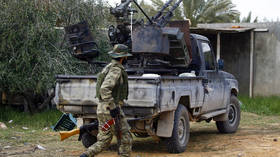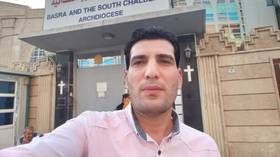‘A month or 2 ago nobody thought it could happen’: Moscow hosts talks between Libya’s rival parties in hopes of ending civil war

Russia enjoys a unique position as the most-trusted and impartial player in the Libyan peace process, which helped the country bring together the two chief civil war rivals for talks in Moscow.
The years-long chaos in Libya “didn’t give much room for optimism,” so “a month or two ago no one had thought that the leaders of the two main warring factions would arrive in Moscow and sit down to negotiate,” President of the Institute of Oriental Studies of the Russian Academy of Sciences, Vitaly Naumkin, told RT.
The talks in Moscow are a serious [diplomatic] breakthrough for Russia in Libya… They have solidified Russia’s position as an impartial mediator.
Fayez al-Sarraj, the head of Libya’s Tripoli-based UN-backed Government of National Accord (GNA), and his rival, the Libyan National Army (LNA) commander Field Marshal Khalifa Haftar, arrived for peace talks in Moscow on Monday. Turkish Foreign Minister Mevlut Cavusoglu and his Russian counterpart, Sergey Lavrov, are intermediaries in the discussions.
Also on rt.com Forces of Libya’s Haftar and Tripoli-based GNA join ceasefire suggested by Putin & ErdoganGrigory Lukyanov, a senior lecturer at the Moscow-based Higher School of Economics, stressed that Russia’s unique role as “an independent, neutral mediator” provides a chance to actually bring the conflicting parties together after all previous formats failed to do so.
Russia is de facto the only player today that has the trust of both the GNA and the HoR, as well as enough trust of Turkey and Egypt. No other nation in or outside the region enjoys the same level or trust and support.
Haftar, for one thing, agreed to fly to Moscow because he does not consider Turkey an impartial side in the conflict, Lukyanov told RT. The researcher noted that Russia’s primary goals are to end the bloodshed in Libya and lay the groundwork for further dialogue.
“The main task right now is to convince the parties that dialogue is better than war,” he said, adding that Turkey prefers a peace process to be created for Libya that would be similar to the existing Astana talks for Syria.
Naumkin agreed that a “lasting ceasefire” would be the most tangible result coming out of the talks.
Also on rt.com A humanitarian intervention? Situation in Libya is ‘catastrophic’, says ex-foreign ministerLibya has been devastated by war since 2011, when its longtime ruler Muammar Gaddafi was toppled and killed during a NATO-led bombing campaign.
“NATO had never intended to bring democracy to Libya,” Naumkin said. Remembering that the military bloc’s mission focused on getting rid of Gaddafi, which ultimately led to the collapse of state institutions, he added: “Democracy can never be introduced at the point of bayonets.”
Lukyanov noted that it was “difficult to expect” that well-functioning democratic institutions could emerge after intervention from abroad. Russia warned about this back in 2011 and continues to do so today, he said, adding that the current “crisis was triggered by the ill-conceived, destructive actions of the US and its allies such as France.”
Think your friends would be interested? Share this story!













